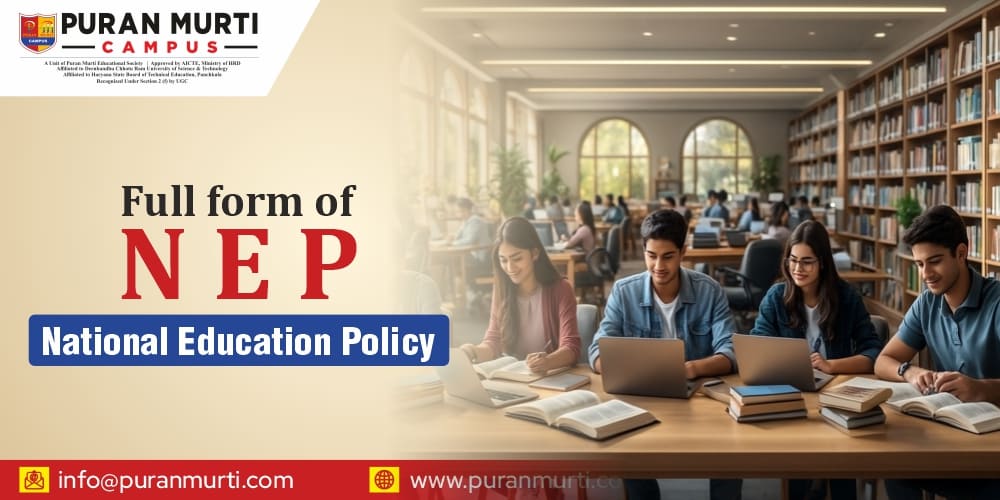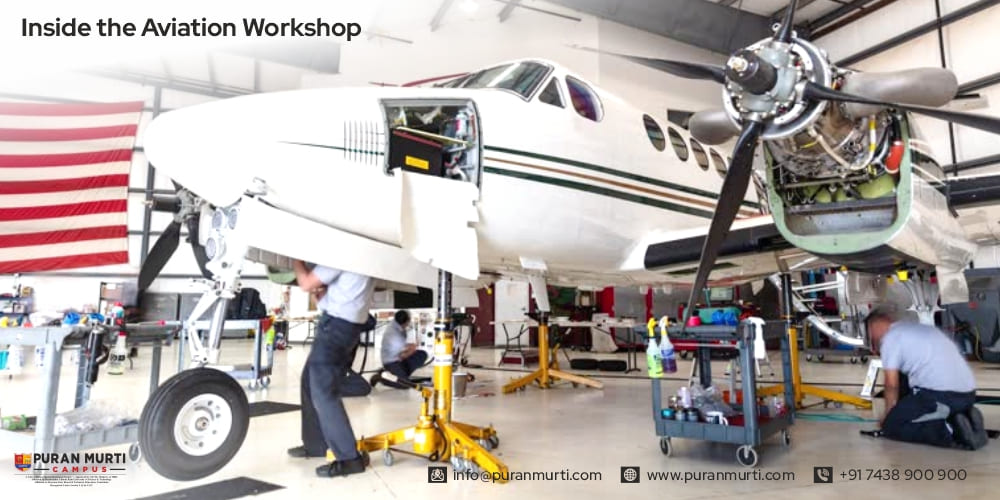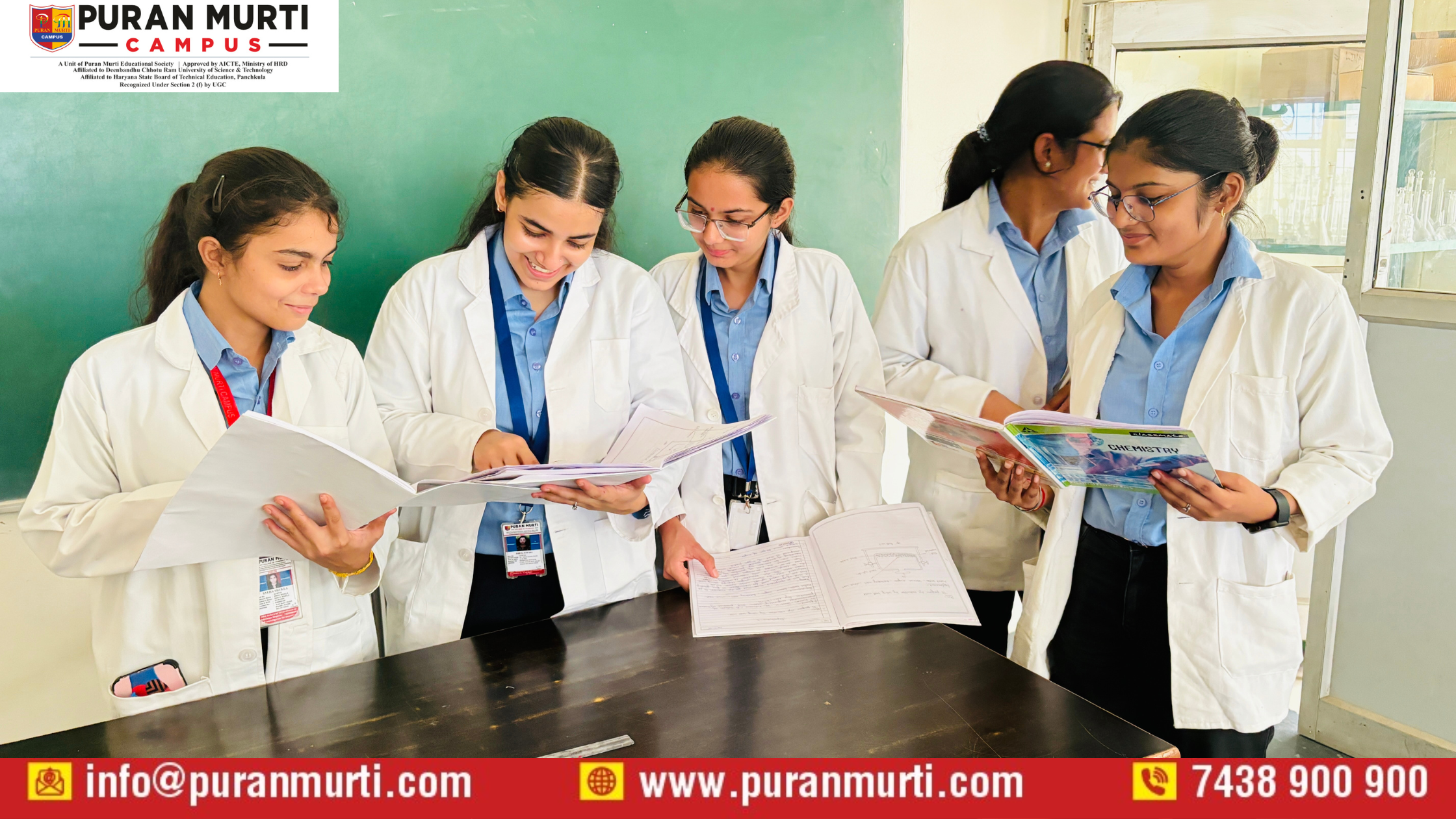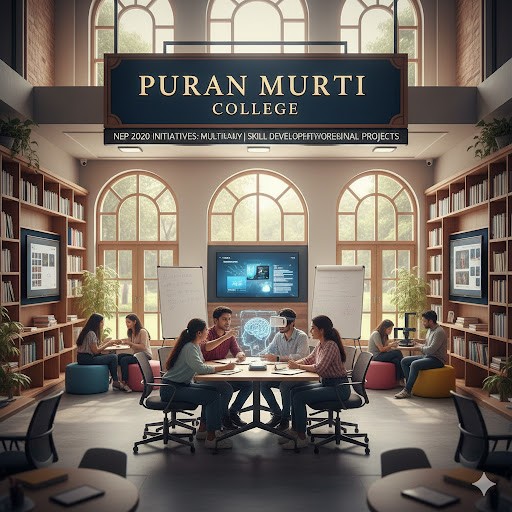NEP 2020-A New Era for Education in India
Posted on : 21 November, 2025 9:33 pm
Unpacking NEP 2020: A New Era for Education in India
The National Education Policy 2020 (NEP 2020) marks a truly monumental shift in India’s educational landscape. This ambitious policy aims to transform the entire education system, from early childhood to higher education, preparing students for the 21st century’s rapidly evolving demands. Here at Puran Murti Global School, understanding NEP 2020 isn’t just academic; it’s about embracing a future where learning is more flexible, holistic, and focused on real-world skills.
Let’s delve into what this groundbreaking policy entails and how Puran Murti Global School is integrating its core principles to benefit every student.
What Exactly is NEP 2020?
Simply put, the Government of India introduced NEP 2020 to guide the development of education across the country through a comprehensive framework. This policy replaces the 34-year-old National Policy on Education (1986), envisioning an education system rooted in Indian ethos that can contribute to India becoming a truly global knowledge superpower. Crucially, NEP 2020 emphasizes developing the full potential of each individual, fostering critical thinking, creativity, and problem-solving skills, rather than just rote learning.
Puran Murti Global School deeply commits to these ideals, ensuring our students are not merely degree holders but well-rounded, capable individuals ready for the challenges of tomorrow.
Key Highlights of National Education Policy 2020
To understand how this affects you, let’s break down the major changes introduced by the Ministry of Education.
-
The New 5+3+3+4 School Structure
One of the most talked-about and fundamental reforms introduced by NEP 2020 is the shift from the traditional 10+2 structure to a new 5+3+3+4 curricular structure. This progressive model is carefully designed to align with the cognitive and developmental stages of children, covering ages 3-18. Specifically, it ensures that learning experiences are age-appropriate and build systematically.
-
Foundational Stage (5 years): Age 3-8
- This includes 3 years of Anganwadi/Preschool/Balvatika, followed by 2 years in primary school (Grades 1-2).
- Key Idea: The focus is on multi-level, play-based, and activity-based learning, emphasizing early childhood care and education (ECCE).
-
Preparatory Stage (3 years): Age 8-11
- Covers Grades 3, 4, & 5.
- Key Idea: Introduces more formal, yet still activity-based learning, across subjects like reading, writing, speaking, physical education, art, languages, science, and mathematics.
-
Middle Stage (3 years): Age 11-14
- Encompasses Grades 6, 7, & 8.
- Key Idea: Focuses heavily on critical learning and experimental concepts in subjects like Science, Mathematics, Arts, Social Sciences, and Humanities. Significantly, vocational exposure also begins in this stage, preparing students for practical skills.
-
Secondary Stage (4 years): Age 14-18
- Includes Grades 9, 10, 11, & 12. This stage is designed to be highly multidisciplinary.
- Key Idea: Students gain greater flexibility in subject choices, thereby allowing for deeper critical thinking, attention to life aspirations, and exploration across various disciplines. There will be two phases (Classes 9-10 and Classes 11-12) with some commonality.
Implications: This new age-based structure at Puran Murti Global School ensures that every child receives appropriate learning experiences at each crucial developmental stage, with a strong, early emphasis on foundational learning from age 3.
-
Multilingualism and Language Power
The policy strongly emphasizes the mother tongue or local language as the medium of instruction, at least until Grade 5, but preferably till Grade 8. Indeed, this vital approach helps students grasp complex concepts faster and more effectively, minimizing the language barrier. Puran Murti Global School fully supports this approach to ensure effective and inclusive learning for all our students.
-
Transforming Assessment
NEP 2020 shifts significantly from a purely summative (exam-focused) assessment model to a more holistic, regular, and formative assessment that is competency-based. This comprehensive approach means:
-
Reduced Syllabus:
The curriculum will be streamlined to its core essentials, making way for critical thinking, inquiry-based learning, and deeper understanding.
-
360-degree Holistic Progress Card:
Students will receive a comprehensive PARAKH– progress card that includes self-assessment, peer assessment, and teacher assessment, thereby reflecting their progress across various domains – cognitive, affective, and psychomotor. This includes skills, aptitudes, values, and even non-academic areas like sports and arts.
Comparison: Old System vs New NEP System
To further highlight the profound impact of these reforms, Lets look at a quick comparison of the old and new educational frameworks:
| Feature | Old System (10+2) | New NEP System (5+3+3+4) |
| Structure | 10 years (School) + 2 years (Higher Secondary) | 5+3+3+4 covering ages 3 to 18 |
| Early Education | Limited focus on preschool (3-6 years) | Strong emphasis on ECCE (Early Childhood Care and Education) from age 3 |
| Streams (Secondary) | Rigid separation (Science, Commerce, Arts) | No hard separation; students can mix subjects |
| Assessment | Summative (Final Exams focused on rote) | Formative (Continuous Assessment & Skills) |
| Curriculum | Rote learning focused | Experiential, holistic, integrated, inquiry-driven, discovery-oriented |
-
Vocational Education Integration
Historically, vocational subjects were often seen as “inferior” to mainstream academic subjects. However, NEP 2020 changes this narrative entirely. Vocational education will now be integrated into mainstream education in a phased manner, starting from Grade 6. Consequently, students will have the opportunity to intern with local vocations like carpentry, gardening, pottery, and other essential skills.
- At Puran Murti Global School, we are enthusiastic about providing early exposure to vocational training and skill-based learning, which in turn aligns with the NEP’s goal of making students resourceful, skilled, and entrepreneurial.
-
Teacher Education and Standards
The policy also introduces significant reforms in how teachers are trained and developed. Moving forward, by 2030, the minimum degree qualification for teaching will be a 4-year integrated B.Ed. degree. This crucial step ensures that the educators shaping the minds of the future are highly qualified, extensively trained, and proficient in modern pedagogical methods.
-
Digital Education & Technology Integration
Recognizing the immense power of technology, NEP 2020 promotes its extensive use in education. This includes online learning, digital libraries, educational software, and establishing the National Educational Technology Forum (NETF) to facilitate this integration.
- Impact at Puran Murti Global School: We are continually upgrading our digital infrastructure, integrating smart classrooms, online learning platforms, and a wealth of digital resources to provide a seamless and technologically advanced learning environment for our students.
-
Flexible Curriculum & Credit System
The policy promotes a flexible curriculum with multiple entry and exit options in higher education. So that, students can take a break from their studies and re-enter later, with their earned credits stored digitally in an Academic Bank of Credits (ABC).
- Impact at Puran Murti Global School: We are preparing to integrate the Academic Bank of Credits system, offering unprecedented flexibility for our students to manage their educational journey according to their life circumstances.
-
Focus on Experiential Learning & Skill Development
NEP 2020 strongly advocates for experiential learning, critical thinking, and vocational education from an early stage. Eventually, to move away from memorization towards practical application and problem-solving.
- Impact at Puran Murti Global School: We are enhancing our curriculum with more project-based learning, internships, workshops, and real-world case studies to ensure our graduates are job-ready and possess practical skills.
Detailed Assessment Reforms: A Deeper Look
Beyond the shift to a competency-based model, NEP 2020 outlines further specifics for assessment:
-
Board Exam Reforms:
Board exams (for Grades 10 and 12) will be reformed to be easier, testing core capacities rather than memorized facts. Furthemore, they may be offered twice a year, with students allowed to take the exam when they feel ready, and to improve their scores. The possibility of modular exams (e.g., taking exams for different subjects at different times) is also being explored.
-
PARAKH:
Performance Assessment, Review, and Analysis of Knowledge for Holistic Development-PARAKH. This is a proposed National Assessment Centre that will set norms, standards, and guidelines for student assessment and evaluation for all school boards in India. In addition, it will guide state assessment systems and conduct surveys to monitor learning outcomes.
-
Grading System:
While specific grading scales might still vary, the spirit of NEP 2020 is to move towards a system that truly reflects a student’s holistic development and competencies, rather than solely relying on a single final exam score. Therefore, the holistic progress card will likely use a more descriptive approach alongside traditional grading.
In essence, NEP 2020 aims for a more humane, flexible, and accurate assessment system that supports student learning and development across all facets. Puran Murti Global School will be adapting its internal assessment and reporting mechanisms to align with these broader national guidelines.
Why This Matters for Puran Murti Global School Students
For current and prospective students of Puran Murti Global School, the NEP opens up a world of possibilities. The flexibility to choose subjects across disciplines prepares them for the complex, interdisciplinary nature of modern jobs and future higher education. Moreover, the strong focus on critical thinking, creativity, and practical skills in school education aligns perfectly with our ethos at Puran Murti Global School, where we consistently encourage students to look beyond textbooks and engage in experiential, real-world learning.
How Puran Murti Global School is Adapting to NEP 2020
At Puran Murti Global School, we are not just observers of these monumental changes; we are active participants in shaping the future of education. Our commitment to providing a high-quality, relevant, and holistic education aligns perfectly with the spirit of NEP 2020.
| NEP 2020 Principle | Puran Murti Global School’s Approach |
| Multidisciplinary Education | Developing flexible subject choices, encouraging interdepartmental learning, and promoting joint projects across disciplines. |
| Experiential Learning | Integrating more project-based learning, field trips, hands-on workshops, and practical activities into our programs. |
| Skill Development | Offering value-added courses, soft skill training, career counseling, and fostering entrepreneurial thinking. |
| Technology Integration | Leveraging digital learning platforms, smart classrooms, e-resources, and promoting digital literacy for all students. |
| Holistic Assessment | Implementing continuous and comprehensive evaluation methods that measure critical thinking, analytical skills, and overall personal development. |
| Student-Centric Approach | Providing personalized academic and career guidance, fostering a supportive learning environment, and addressing student well-being. |
The Future of Education is Bright
NEP 2020 is a visionary document that promises to make Indian education more equitable, accessible, and relevant to global standards. As Puran Murti Global School embraces these reforms, we are excited about the opportunities they present for our students to thrive, innovate, and become responsible citizens of the world. The journey ahead is transformative, and we invite you to be a part of this exciting new era of learning at Puran Murti Global School.
Frequently Asked Questions:
1. What is NEP 2020? NEP 2020 is the National Education Policy 2020. The Government of India introduced this comprehensive framework to guide education’s development across the country, from early childhood to higher education.
2. When did NEP 2020 receive approval? The Union Cabinet approved NEP 2020 on July 29, 2020, replacing the National Policy on Education of 1986.
3. What does NEP 2020 primarily aim to achieve? NEP 2020 primarily aims to transform India’s education system. It will meet the 21st century’s needs by focusing on holistic development, critical thinking, skill-based learning, and a multidisciplinary approach.
4. How does NEP 2020 impact school students? It introduces a new 5+3+3+4 school structure which promotes multidisciplinary learning, emphasizes vocational education from Grade 6, and shifts to competency-based assessments.
5. What is the 5+3+3+4 structure? The 5+3+3+4 structure is the new school framework. It comprises 5 years of foundational, 3 years of preparatory, 3 years of middle, and 4 years of secondary schooling, covering ages 3-18.
6. Will NEP cancel board exams? No, board exams for Grades 10 and 12 will continue. However, the policy will redesign them to test core competencies and analytical skills.
7. Does Puran Murti Global School follow NEP guidelines? Yes, Puran Murti Global School actively aligns its curriculum and teaching methodologies with NEP 2020’s visionary goals to offer holistic education.
8. What goal does NEP set for vocational education? NEP aims to integrate vocational education into mainstream schooling from Grade 6. This will provide students with practical skills and exposure to various vocations.
9. What does “multidisciplinary” mean in NEP for schools? Multidisciplinary means students will choose subjects across different traditional streams (like science, arts, commerce) without strict boundaries. This fosters broader learning.
10. What is PARAKH? PARAKH (Performance Assessment, Review, and Analysis of Knowledge for Holistic Development) is a proposed new National Assessment Centre. It will set norms, standards, and guidelines for student assessment and evaluation.
11. What about the medium of instruction? NEP 2020 emphasizes the importance of teaching in the mother tongue or local language up to at least Grade 5, and preferably up to Grade 8 and beyond.
12. How will education utilize technology under NEP 2020? NEP 2020 promotes extensive use of educational technology. This includes online learning, digital content, virtual labs, and a dedicated National Educational Technology Forum (NETF) for research and implementation. Puran Murti Global School actively integrates these tools.






